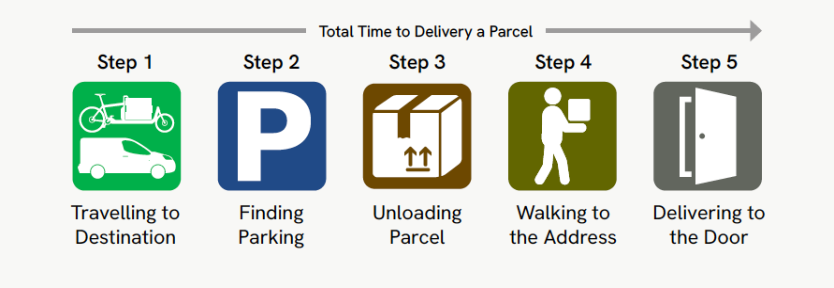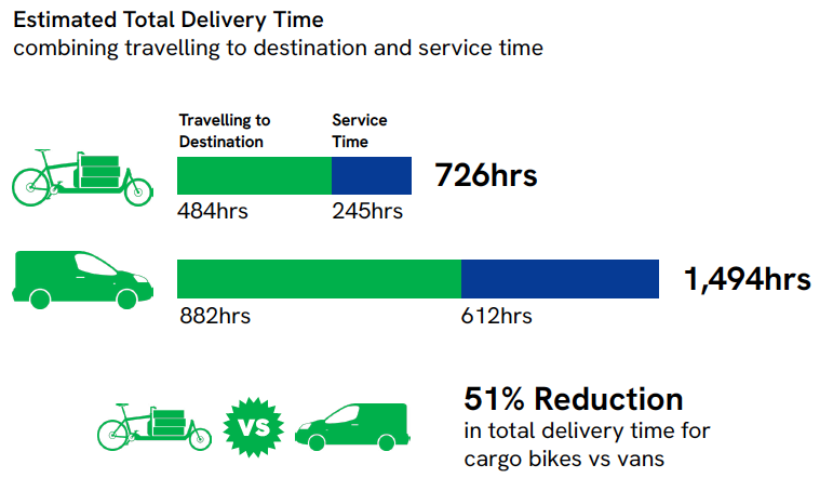Last mile deliveries are soaring and cargo bikes are about to disrupt the business. A new study shows that Bullitt cargo bikes are twice as efficient for delivery and up to 10 times cheaper to operate compared to vans. In addition, using cargo bikes will cut congestion and pollution dramatically, researchers say.

An electric Bullitt cargo bike delivers goods in central Brussels. Experts predict that cargo bikes can replace over half of urban van deliveries, thanks to their faster speeds on congested roads, minimal time spent looking for parking, and shorter routes across cities.
When delivering goods in central Brussels the electric Bullitt cargo bikes covered 30% shorter routes, and travelled at 16 km/h versus 11 km/h for vans constrained by congestion, according to the study. The cargo bikes were over 2 times faster than vans using 48 min. versus 99 min. on a typical 8.5 km bike route in Brussels urban centre.
Over a month and a half, the cargo bikes delivered 10.1 packages per hour on average, while vans were able to deliver 4.9 packages per hour to the same destinations. Bikes bypass traffic jams, take shortcuts through streets closed to through traffic and ride to within 30 metres of delivery points on average, minimising walking time. Meanwhile, previous studies have shown that vans can spend up to 25 min per stop searching for parking.
The study used GPS-data tracking two-wheeled electric Bullitt cargo bikes from the courier company Urbike in Brussels, Belgium. Due to lack of van data the GPS-data from the bikes was compared to simulated van data.
Modelling total cost of ownership further proves bikes’ economic advantages. Purchase prices for electric Bullitt cargo bikes are a fraction of typical diesel and electric vans. Adding insurance, maintenance, depreciation, and energy costs, vans have up to 10 times higher expenses per parcel. When including fixed and variable costs, each delivery cost €0.10 with the cargo bike, €1.10 with a small diesel van and €1.05 with a small electric van.
Zero-emission cycling logistics
The electric Bullitt cargo bikes also slash greenhouse gas emissions by 96-98% relative to both diesel and electric vans based on comprehensive life cycle assessments. By 2025, global package deliveries are projected to hit 200 billion, a significant jump from the fewer than 90 billion in 2018 (Statista, 2021). A recent study in Paris showed that 67% of daily van operations by a prominent logistics operator could be seamlessly transitioned to cargo-bikes without incurring additional costs (Robichet et al., 2022). So while ensuring an efficient, fast and reliable last mile delivery system with cargo bikes, it will also contribute to dramatic reductions of CO2 emissions, air pollution and road traffic collisions.
It has increasingly become a powerful argument for urban policymakers in favour of the transition to cargo bikes. And also for their voters, the city dwellers, for whom the transition will contribute to more humane cities with better and safer living conditions. If you live and work in an urban area and travel to work every day – perhaps dropping your child off at daycare or school as well – then you can save many hours of transportation per year using a cargo bike instead of a car.

Transport accounts for 30% of a city’s carbon emissions and is expected to grow at a faster rate than any other sector in the coming decade.
The potential of cargo bikes
However, the efficiency of bike-based delivery is not common knowledge among logistics professionals. ”Today, many operators still don’t understand the potential of cargo bikes,” says Nicolas Collignon, co-founder at Kale AI with a PhD in computational cognitive science and lead author of the report. ”So, a lot of the decisions that are being made are still based on assumptions and misconceptions. Having data and studies that prove the benefits and the potential of cargo bikes can mean that it can accelerate the transition to much more sustainable and much more efficient ways of moving things around in cities.”
”One of the big misconceptions when people think of urban deliveries is that the most important thing is how fast the vehicle can move. But studies have shown that more than 50% of the delivery driver’s day is spent looking for parking or with the van parked because the driver will choose to walk between stops because it’s so cumbersome to find another parking spot.”
Congestion and the boom of e-commerce
The problem with congestion in cities will only get worse according to Maria Sinziiana Astefanoaei, assistant professor at the IT University of Copenhagen, PhD in computer science and working with human mobility/spatiotemporal data, explains: ”With such a large increase in urbanization, as we are witnessing currently, space becomes a very valuable and scarce resource. The e-commerce industry boomed during the pandemic with home delivery, and it’s only going to increase in the coming years. Traffic and congestion in all major cities are soaring; delivery vans are a significant part of this development. So, we have to ask ourselves whether having half empty vans stuck in rush hour traffic makes sense? Or is there a better solution? Replacing diesel vans with electric vans doesn’t solve the problem of space and congestion. The cargo bike, given its smaller size, nimbleness in traffic and the ability to park close to the destination, is a real and much more efficient alternative in dense urban areas.”

By 2025, global package deliveries are projected to hit 200 billion, a significant jump from the fewer than 90 billion in 2018.
Not just a hunch
Until now there has been a lack of insights to strengthen the evidence base for people and cities worldwide to confidently transition substantial portions of urban freight to zero-emission cycling logistics. ”When we started the company, we did not have a clear idea from a data perspective to scientifically show how much more efficient we were compared to alternative means of delivery such as trucks and vans,” says Pierre Hanoune, COO & CTO at Urbike in Brussels, the bike logistics company that participated in the study.
”Thanks to the study and the GPS-chips put in our bikes we now have actual data showing the efficiency of bike-based delivery. This confirms the hunch we had, that it is a suitable tool for urban deliveries. The average speed of our bikes is much faster than vans, but more important and the main benefit for our customers is the predictability when it comes to the delivery times. A bike doesn’t get stuck in traffic and can always park next to the destination. The ETA we communicate to our customers when the round is starting, is usually met when we arrive.”
”We are very focused on delivering a professional service. It’s important for us not to be seen as a bike delivery company first, but as a regular logistics operator as professional as any that happens to be using bikes as their tool because it’s more efficient, more predictable, and because the negative externalities are much less compared to the alternatives.”
The Study – in short:
-
”Data-driven Evaluation of Cargo Bike Delivery Performance in Brussels”, released October 2023 by Kale AI, a London-based startup specialising in AI-driven solutions designed to innovate urban logistics.
-
The study used GPS-data tracking two-wheeled electric Bullitt cargo bikes from the courier company Urbike in Brussels, Belgium. Due to lack of van data the GPS-data from the bikes was compared to simulated van data.
-
The study introduces a framework to guide the analysis of vehicle performance in order to accommodate the lack of rigorous methodology. The delivery process is segmented into different steps and studied separately. Different urban areas are defined so the performance of different vehicles can be precisely measured.
-
Kale AI installed GPS trackers on 9 of the courier company Urbike’s electric Bullitt cargo bikes.
-
Data collection started in October 2022 and was carried out over a period of 1.5 months.
-
7,340 deliveries were tracked on 907 delivery routes of the bikes.
-
Kale AI designed a matching algorithm so they were able to pair the GPS traces with the courier company’s task dataset.

In order to compare the performance of the different vehicles (cargo bikes and vans), the delivery process is defined into five steps.
-
Route lengths for vans and cargo bikes were compared. Due to lack of access to van data the comparison was made using the Google Maps API for both vans and cargo bikes.
-
The total driving distance to the same addresses were 7,709 km for the cargo bikes and 9,977 km for the vans. That is a 30% reduction in route distance for cargo bikes.
-
When travelling to the same addresses cargo bikes covered an average of 8.5 km per route while vans covered 11 km per route. On average, vans would take 99 minutes per route, compared to 48 minutes for bikes.
-
The study showed that the cargo bikes had a consistent speed across all the urban areas at 16 km/h in the suburbs and urban core as well as the urban fringe. According to the 2018 INRIX Global Traffic Scorecard the average last-mile speed of vans in Brussels is 11 km/h. This makes cargo bikes driving speed 45% faster than vans:
-
The estimated total driving time for cargo bikes were 481 hours (7,709 km/16 km/h) and for vans it was 882 hours (9,977 km/11 km/t). This makes a 45% reduction in travel time for cargo bikes compared to vans.
-
With tracking showing an average parking distance of 30 metres from the delivery spot the cargo bikes have an estimated time spent parking and walking to the destination of 2 minutes. Precise data on van service time in Brussels is limited, but studies in other cities provide useful benchmarks, and a conservative estimate of 5 minutes average for van service time was assumed.
-
The total delivery time for vans versus cargo bikes were then calculated by combining the analysis on driving distances, vehicle speeds, and service times on the delivery company’s real-world routes in Brussels. It shows a 51% reduction in total delivery time for cargo bikes versus vans.

This modelling highlights that for real-world routes in a dense city like Brussels, cargo bikes provide over a 2x speed advantage for the last mile delivery. The Bullitt cargo bike’s combination of agility, access, and efficiency in urban centres make them a superior choice for urban deliveries.
-
The cargo bikes made 10.1 deliveries per hour while vans made 4.9 deliveries per hour. With working days in 1 year set at 250 days (2,000 hours) the number of deliveries is 20,200 for cargo bikes and 9,800 for vans per year.
-
The study highlights that for real-world routes in a dense, medieval city like Brussels, cargo bikes provide over a 2 times speed advantage for the last mile. Their combination of agility, access, and efficiency in urban centres make them a superior choice for urban deliveries.
-
To quantify the economic impact of using cargo bikes versus vans the cost per parcel was estimated to €0.10 for a Bullitt cargo bike, €1.10 for a diesel van and €1.05 for an electric van.
-
The study highlights that even if a van is able to deliver as many parcels as a cargo bike, the cargo bike still has 1/5 the total cost per parcel compared to diesel and electric vans.
-
Life cycle analysis shows that the electric Bullitt cargo bike achieves a 98% reduction in greenhouse gas emissions when placed beside diesel vans and a 96% reduction against electric vans.
-
Widespread cargo bike adoption could catalyse broader improvements to urban life and sustainability.

Widespread adoption of cargo bikes could help decongest cities, improve air quality, and promote sustainable urban transport overall.
